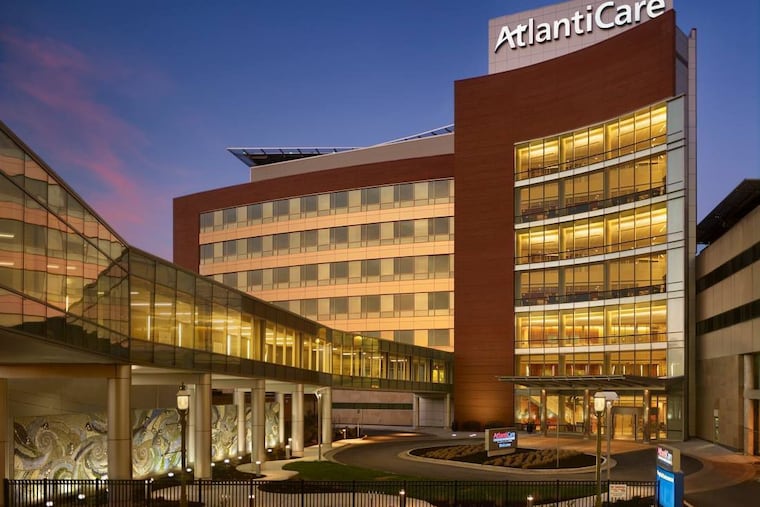AtlantiCare Health System wants to double its revenue to $2 billion over the next six years
The ambitious plan includes an alliance with Cleveland Clinic for cancer care and the launch of a Drexel College of Medicine branch campus.

AtlantiCare Health System outlined an ambitious plan on Wednesday to spend $1 billion expanding services at its Jersey Shore hospitals and to double its annual revenue to $2 billion in the next six years.
Changes include an affiliation with the Cleveland Clinic Cancer Institute, the construction of a Drexel University College of Medicine branch campus, a complete revamp of its information technology systems by Oracle Health, and the launch of a neurosciences program with a Philadelphia-area private physicians group, Global Neurosciences Institute.
AtlantiCare also plans to build a cardiac-care tower, a small children’s hospital, and a dedicated behavioral health facility on its Galloway campus, located 13 miles northwest of Atlantic City, where it has another hospital. Those buildings are in the early planning stages.
The 125-year-old nonprofit health system aims to remain independent and focused on the Jersey Shore communities it serves during an era of rapid health-care consolidation, CEO Michael Charlton said in an interview.
“It’s our responsibility to take care of this region and take care of the people in it. There are other organizations gaining size and scale through mergers,” Charlton said. “We don’t see transferring care out of this community to another organization as the right level of care.”
AtlantiCare is embarking on its strategic plan as Philadelphia health-care giants Thomas Jefferson University and the University of Pennsylvania Health System are working on deals to expand their reach in Pennsylvania. And in New Jersey, Cooper Health System is about to acquire Cape Regional Health System in Cape May Court House.
AtlantiCare went through a merger in 2015, when it became part of Pennsylvania’s Geisinger Health. It decided to separate in 2020. After that experience, the AtlantiCare board and leadership want to take a different path, Charlton said.
AtlantiCare has strong “AA-” credit ratings from Fitch and Standard & Poor’s, thanks largely to strong cash reserves and a relatively small amount of debt.
Its goals go beyond expanding medical services to include community-health improvement targets: reduce patients’ food insecurity by 6%, cut unsheltered homelessness by 10%, and expand life expectancy by 5 years.
Drexel School of Medicine branch campus
Workforce development needs motivated AtlantiCare’s interest in starting a branch campus of Drexel’s College of Medicine.
Inspiration came from the branch campus that Drexel has with Tower Health in West Reading. “We went up and saw that model, and it is exactly what we’re looking for,” Charlton said. The initial cohort of 40 students started there in August 2021.
Starting next year, Drexel will send third- and fourth-year medical students to train at AtlantiCare facilities. Drexel and AtlantiCare are still working on agreements for a medical school branch. It could be three years before that opens, Charlton said.
Geisinger’s Commonwealth School of Medicine, based in Scranton, currently has a branch campus at AtlantiCare, but that relationship will end when current students are finished in 2027.
Expanding cancer care with Cleveland Clinic
AtlantiCare’s selection of Cleveland Clinic for a cancer alliance follows Cooper Health’s decade-old relationship with MD Anderson in Camden. In both cases, the partnership with nationally known providers is designed to help smaller systems to compete with Philadelphia-area cancer giants Penn Medicine, Fox Chase Cancer Center, and Jefferson Health.
“We’re not looking for a branding opportunity,” Charlton said. “We’re looking for a tie to an organization to uplift our clinical operations and to provide not just excellent care, but world-class care.”
The goal of Cleveland Clinic affiliation is to grow AtlantiCare’s cancer treatment business to the point where it not only keeps patients in AtlantiCare’s core market, but draws patients from elsewhere.
Charlton declined to share financial details on the relationship with Cleveland Clinic.
AtlantiCare had a long-term alliance with Philadelphia’s Fox Chase Cancer Center until recently, but it wasn’t getting much out of that relationship, Charlton said.
Neurosciences push
AtlantiCare has long relied on Jefferson Health physicians for neurosurgery services and associated critical care for stroke patients, but it now seeks to develop a comprehensive neurosciences program to care for people with Alzheimer’s, dementia, Parkinson’s disease, balance disorders, and other diseases of the nervous system, Charlton said.
“We were never going to get there with our current affiliation,” he said.
Global Neurosciences Institute took over critical surgeries this year. Over the next 18 months, AtlantiCare plans to develop a joint venture for a broader partnership with Global Neurosciences.
Global Neurosciences was founded by a group of former Jefferson physicians and also provides services at Trinity Health Mid-Atlantic hospitals, Holy Redeemer Medical Center, and other Philadelphia-area facilities.
AtlantiCare’s hospital in Atlantic City is one of four in Southern New Jersey certified to provide the highest level of stroke care through the Joint Commission, which sets standards for quality improvement and patient safety.
Information technology revamp
AtlantiCare is turning to Oracle Health, a division of database giant Oracle Inc., for help making its electronic medical records and information technology systems work better.
Plans call for using emerging AI technology to ease the workload on doctors and other health-care providers, so they can spend more time with patients, Charlton said.
“Having disparate systems across the enterprise, just because they were best in class, is not the way to do it. We are all in with Oracle powering AtlantiCare,” he said.